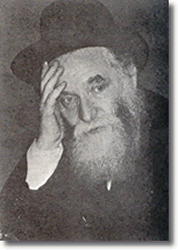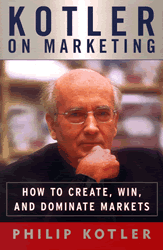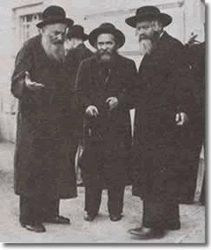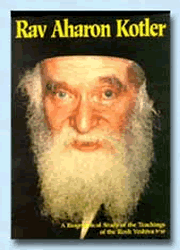Rosh Yeshivah of Bais Medrash Govoha,
Lakewood, NJ
S.C. Johnson & Son Distinguished Professor of International Marketing, Kellogg Graduate School of Management, Northwestern University
Philip Kotler is S. C. Johnson & Son Distinguished Professor of International Marketing at Kellogg Graduate School of Management at Nothwestern University. He holds an MA in economics from the University of Chicago and a Ph.D. in economics from M.I.T.
He has been at Kellogg since 1962, serving as S.C. Johnson & Son Distinguished Professor of International Marketing, Harold T. Martin Professor of Marketing, Montgomery Ward Professor of Marketing.
He is the recipient of numerous awards, including honorary doctorate degrees from Cracow School of Economics, University of Stockholm, Groupe HEC, Catholic University Santo Domingo, Athens University of Economics and Business and the University of Zurich.
He is a member of the Marketing Science Institute and former chairman of the Institute of Management Sciences, as well as a former director and program chairman of the American Marketing Association, and an advisory board member of the Peter F. Drucker Foundation for Nonprofit Management. He serves on the editorial boards of the Journal of Segmentation in Marketing, Journal of Nonprofit and Voluntary Sector Marketing, International Business Review, Journal of International Marketing.
His research areas include strategic marketing, marketing organization and planning, marketing for cultural organizations, hospitality, tourism and place marketing, international marketing, social marketing, marketing and economic development. Current projects include studies of high-tech marketing; studies of museum strategies for building audiences and raising funds, and studies of how cities, regions and nations develop competitive advantages.
http://www.businessweek.com/bschools/books/recommenders/kotler.htm
Accompanied by an interpreter, Mr. Irving Bunim, to translate his Yiddish
into English, Rabbi Kotler pleaded to Mr. Morgenthau for government
cooperation in the rescue work.
"If I am seen to favor my Jewish brethren, I will soon be out of
office," said Mr. Morgenthau.
To this Rav Aharon told the interpreter to reply: "Saving Jewish
lives is more important than holding even twenty positions like yours."
At first the interpreter refused to translate these words. Noticing
the argument, Mr. Morgenthau insisted that he be told what Rabbi Kotler
had said, and the interpreter acquiesced. Rabbi Kotler's reply so impressed
him that he said, "If so, I will do my utmost and face the consequences."
As it turned out, Mr. Morgenthau's efforts proved invaluable in setting
up the War Refugee Board, and he continued in office until after the
death of President Roosevelt, who had appointed him. [Submitted by Rabbi
Berel Simpser, Des Moines Kollel]
On the fast day of the Tenth of Teves, during the height of World War
II, Rabbi Ahron Kotler took the well known activist Irving Bunim (born
in Volozhin) on a train trip to Washington. The war in Europe was raging,
Jews were being exterminated, and the two had to see a high-ranking
Washington official to plead with him in every possible way -- "save
our brothers." On the way down to Washington Rabbi Kotler tried
to persuade Bunim to break his fast. "Bunim," he explained.
"You cannot fast now. You need your strength for the meeting."
But Irving Bunim refused to eat. He was sure that he could hold out
until the evening when the fast ended.
The meeting was intense. Rabbi Kotler cried, cajoled, and begged the
official to respond. Finally, the great rabbi felt that he impressed
upon the man the severity of the situation. The man gave his commitment
that he would talk to the President. When they left the meeting Bunim
was exhausted. He mentioned to Rabbi Kotler that he thought the meeting
went well and now he'd like to eat.
Rav Ahron was quick to reply. "With Hashem's help it will be good.
And Bunim," he added, "now you can fast!"
http://216.239.41.104/custom?q=cache:cSlquxlpXT8J:www.torah.org/learning/drasha/5757/vayeishev.html%3Fprint%3D1+rabbi+kotler&hl=en&ie=UTF-8
#kot-5:
Itzhak Schier (moskva770@y
---------------------------------------------------------------------------
Home Page: http://www.frumspace.com
Message: You have a serious error in your Kotler family profile. Rav
Aharon
Kotler's original family name was Pines (as in Ophir Pines-Paz and
Pines Street
in Jerusalem); he left Europe on a false passport issued in the name
Kotler. He is no
relation to any other Kotler other than his direct
descendants.
#kot-6
Rabbi Ahron Kotler (son of Rabbi Shneur Zalman Pines). Known as the
"Shislovitzer iluy" (Svisloch genius), he immigrated to the United States in 1940. He founded the yeshiva and complex of talmudic
institutions in Lakewood NJ. His grandson Rabbi Malkiel Kotler is
rabbi there today.
Rabbi Kotler answered, "As you know, my great grandfather, Rabbi Isser Zalman Meltzer, was Dean of the great Yeshiva in Slutzk. When the war (WWI) threatened, all the students were sent home."
One student upon arriving home was told by his mother: 'I didn't send you all the way to Slutsk just so you should come home!' Not able to afford a train, the young man walked the 400 kilometers back to the yeshiva. When he arrived, my great grandfather Rabbi Meltzer was so impressed with this young man for having walked so far, he kept his shoes as a symbol of self-sacrifice for the study of Torah."
Rabbi Steinman listened, then spoke: "But surely the young man from WWI days is no longer living. Isn't it time to dispose of his shoes?"
"Not living?" said Rabbi Kotler. "He is living! That young man is none other than Rabbi Elazar Menachem Shach!"



